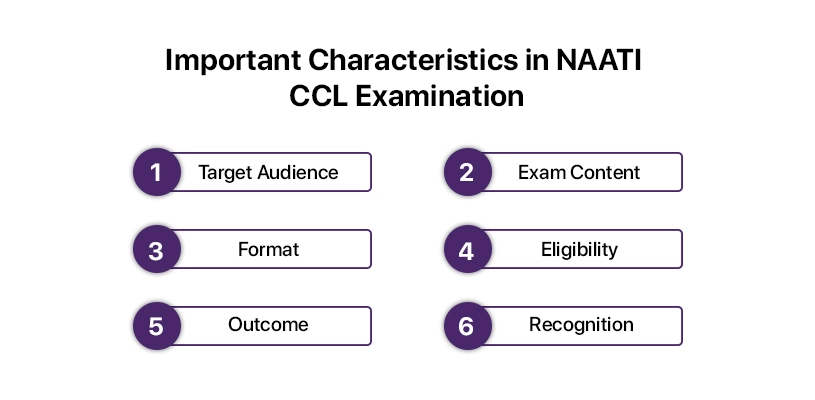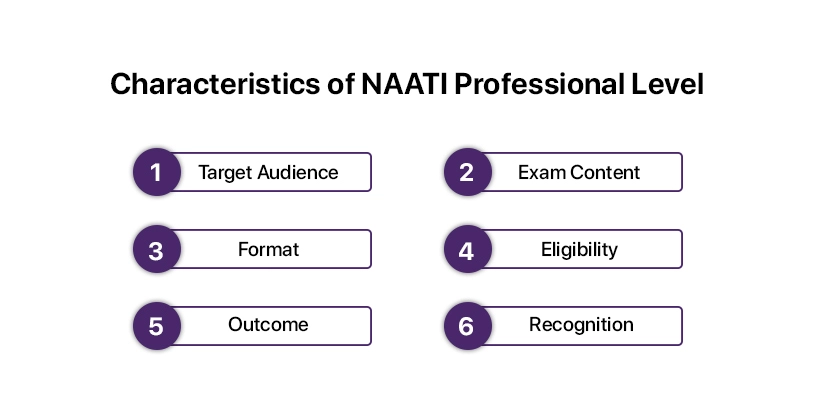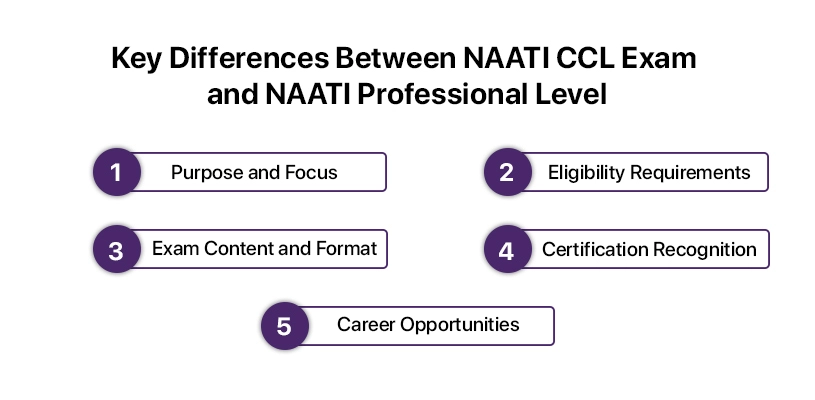Australia functions as a society full of different cultural groups because it receives many immigrants from international sources. National demographics require skilled translators and interpreters because they serve as communication facilitators between groups separated by language barriers. NAATI stands as the core organisation in Australia that conducts accreditation procedures for translators and interpreters.
This entry explores the important distinctions between the NAATI CCL Exam and the NAATI Professional Level by analysing their goals together with their necessities along with their testing structures and employment prospects and their specific advantages for certification.
The following guide serves Australian translators and interpreters and individuals who want to grasp NAATI certification details.q
What is NAATI?
The essential foundation for understanding the CCL Exam and Professional Level certification begins with clarifying what NAATI represents and performs as the main authority of translation and interpretation in Australia.
NAATI functions as the premier organisation that establishes professional standards for translators and interpreters in Australia. NAATI began its operations in 1977 while performing an essential function to verify that language specialists maintain the highest professional standards and follow appropriate ethics.
NAATI advocacy for standards development enables the organisation to grant accreditation to professionals who demonstrate competency for delivering top-quality translation and interpretation services.
NAATI provides certification at multiple levels to serve translators and interpreters across different domains, starting from community-based interpreters to specialist translators and interpreters who work with medical and legal fields.
NAATI CCL Exam: What is it?
Community language specialists can use the NAATI CCL (Credentialed Community Language) Exam as a tool for professional interpreter certification. The CCL exists as a certification that examines interpreter skills for English-language pairs when used in community contexts.
Success in this certification allows interpreters to take community positions that require message accuracy along with effective delivery but exclude specialised interpretation domains such as the legal and medical sectors.
Know more: Is Nepali NAATI the right choice for you? 🤔🤔
Important Characteristics in NAATI CCL Examination

1. Target Audience
Community interpreters make up the core intended audience of the CCL examination programme. The exam targets universal language capabilities across all industries because it does not require expertise in specialised fields like law or medicine.
2. Exam Content
The NAATI CCL examination assesses candidates who need to translate through English and carry out interpretation between English and the test language across common topics about social services government services and community-based matters.
3. Format
The CCL Exam includes two dialogues for assessing interpretation accuracy between English-speaking content and content in the targeted language and from the targeted language to English-speaking content. The dialogues function to evaluate interpreting skills together with listening abilities under realistic conversation settings.
4. Eligibility
Candidates seeking CCL exam admission should have proficiency in both English and their assigned interpretation language, yet lack of professional training or previous experience does not affect their eligibility.
5. Outcome
The NAATI CCL certification will be issued to passing candidates who aim to launch their community interpreter career in Australia.
6. Recognition
Many candidates start their NAATI certification journey through the attainment of a NAATI CCL certificate. The CCL can sometimes earn points when applicants apply for points-based visas under particular subclass categories.
Understanding the NAATI professional level
Translators and interpreters with advanced professional expertise seek the NAATI Professional Level certification because it represents their superior abilities in translation and interpreting work.
Working professionals who wish to perform specialised interpretation need this essential certification because it allows them to pursue advanced roles in both legal and medical fields and demanding expert-level environments. The professional level differs from the CCL exam since it emphasises the evaluation of complex, specialised interpreting situations.
Characteristics of NAATI Professional Level

1. Target Audience
The professional-level certification caters to proficient and professional translators and interpreters who plan to specialise in legal, healthcare or business domains. The certification benefits translators seeking premium positions within their professional field.
2. Exam Content
Candidates have to show their proficiency in specialised translation and interpretation practices during the professional-level assessment. The testing basis for interpreters contains legal and healthcare settings, whereas the translator exam checks their proficiency in complex, specialised documents.
3. Format
The written and oral segments together make up the professional-level examination format. The written exam demands complex document translation, but the oral segment demands instant interpretation work, either within the medical or legal domains.
4. Eligibility
Candidates seeking admission to the professional level requirements need to fulfil exact educational and professional experience criteria, which differ from the CCL exam qualification process. Successful candidates must show proof of professional qualifications and enough practical experience in translation and interpretation along with their certification.
5. Outcome
Promotees who complete the course will obtain NAATI Professional Level certification that establishes their credentials for national as well as global markets. The NAATI Professional Level certification enables professionals to take on positions at the highest level and specialised roles.
6. Recognition
Researchers aiming to work in sectors requiring advanced language capabilities need professional-level certification as an essential requirement for employment in these government, healthcare, and legal fields.
Key Differences Between NAATI CCL Exam and NAATI Professional Level

1. Purpose and Focus
Any person who aims to work as a community interpreter in public settings should take the NAATI CCL Exam. The assessment evaluates the skill to interpret standard non-technical language that people use in their daily lives.
NAATI Professional Level exists for established professionals in translation and interpretation who want to focus on legal or medical or technical specialisations.
2. Eligibility Requirements
Any person who speaks English and another language can take the NAATI CCL Exam without needing prior professional training.
NAATI Professional Level: Requires formal qualifications in translation and interpretation, along with professional experience in specialised fields.
3. Exam Content and Format
The NAATI CCL Exam features two general topic dialogues that serve as the examination material. Basic community interpretation serves as the primary focus of this exam type.
There are written and oral tests for NAATI Professional Level Certification that evaluate the candidate’s technical skills by assessing their performance in complex specialised fields.
4. Certification Recognition
The CCL certification from NAATI provides value at entry-level community interpreting roles, plus it serves as evidence for visa points during immigration processes.
The professional-level NAATI accreditation finds recognition in elevated professional settings, which include government institutions alongside law departments and healthcare organisations and worldwide organisations.
5. Career Opportunities
Community-based interpreting roles make up most of the opportunities available to NAATI CCL Exam passers while they lack access to specialised or higher-level positions.
A professional-level certification from NAATI enables candidates to join specialised, high-paying industries requiring precise knowledge of medical and legal translation and interpretation practice.
Conclusion
The NAATI CCL Exam and the NAATI Professional Level certification serve different purposes within the translation and interpretation profession. Both certifications serve distinct purposes since the CCL Exam stands for entry-level and community work but the Professional Level targets senior translational experts working in advanced situations.
The certification you select depends on your professional direction, your skills and the languages you master. NAATI accreditation through any available pathway increases your professional future prospects, as it generates unlimited opportunities for various positions across Australia and international regions.
FAQs
1. Is NAATI CCL hard to pass?
The NAATI CCL exam is not considered extremely difficult, but it does require a good level of fluency in both English and your other language.
2. Which NAATI test is required for PR?
For permanent residency (PR) in Australia, the NAATI CCL (Credentialed Community Language) Test is often required.
3. Is NAATI harder than PTE?
NAATI may be more challenging for those without strong bilingual skills or interpreting experience, while PTE may be harder for those who are not proficient in English. Both exams require different preparation approaches based on the skills being tested.
4. Who is eligible for the NAATI exam?
Eligibility for the NAATI exam depends on the type of certification you wish to pursue.
5. What are the benefits of NAATI?
The benefits of NAATI are as follows:
- Career Opportunities
- Global Recognition
- Ongoing Development
- Pathway to PR
6. Is the NAATI exam easy?
The NAATI exam is not considered easy, but it is manageable with proper preparation. The difficulty level depends on the exam type and the candidate’s language proficiency and experience.




